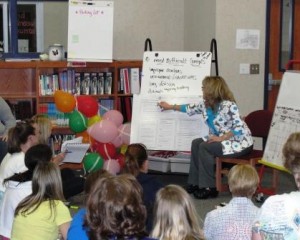
“The task of leadership is not to put greatness in to humanity, but to elicit it, for the greatness is already there.” -John Buchan
This summer I’ve had the honor of working with a great number of dedicated educators. These educators have come with a positive attitude and an open mind. Several of the schools have been sophisticating their implementation of small-group, differentiated instruction they began during the last school year.
One school was planning for the first nine weeks of the school year. The faculty decided to use the first week of school to model and shape the procedures for a week of Tabor Rotation. They also determined to begin full implementation of The Tabor Rotation Framework the second week of school. Why?
As a member of their instructional leadership team put it,
“You can’t do small groups in a classroom half-way. We tried that last year and it didn’t work. Now I know why the 14 Essential Elements of Tabor Rotation are called Essential.”
One of the Essential Elements of Tabor Rotation that teachers tend to skip is the Leadership Academy. All the schools with whom I have worked this summer have recognized the importance of having leaders and co-leaders when using small groups in the math classroom.
A week of Tabor Rotation always includes a Leadership Academy. The Leadership Academy is the time when the teacher trains the leaders and co-leaders from each team how to play the games or work the activities at the 4 stations. After the brief overview of the stations with the whole group on Day 1, and while the rest of the class is working independently, the leaders and co-leaders from each group form a whisper group in a quiet area of the room. They explore the activities and play the games, while asking each other questions and clarifying directions. The teacher checks for understanding and answers questions periodically.
Monday night’s homework, for the leaders and co-leaders, is to study the copies of the games and activities which the teacher sends home with them. Their homework also includes answering the Exit Questions they will ask at the end of a station rotation.
Cultivating leaders and co-leaders changes everything when using small groups. A very basic result of taking the time to train your leaders and co-leaders is having eight people in the room, besides you, who know what to do when the groups are working independently.
Some of the results of having a Leadership Academy can’t be measured by test results. However, they will prove to be invaluable in cultivating your classroom community. As you inspire your leaders and co-leaders this school year, you might want to share some of the following quotes with them. I’ve read them all before, but they inspired me to write this blog today…
“Leadership must be based on goodwill. Goodwill does not mean posturing and, least of all, pandering to the mob. It means obvious and wholehearted commitment to helping followers. We are tired of leaders we fear, tired of leaders we love, and of tired of leaders who let us take liberties with them. What we need for leaders are men of the heart who are so helpful that they, in effect, do away with the need of their jobs. But leaders like that are never out of a job, never out of followers. Strange as it sounds, great leaders gain authority by giving it away.” — Admiral James B. Stockdale
“Management is efficiency in climbing the ladder of success; leadership determines whether the ladder is leaning against the right wall.” — Stephen R. Covey
“The older I get the less I listen to what people say and the more I look at what they do.” — Andrew Carnegie
“The function of leadership is to produce more leaders, not more followers.” — Ralph Nader
“The best executive is the one who has sense enough to pick good people to do what he wants done, and self-restraint to keep from meddling with them while they do it.” — Theodore Roosevelt
Side note: I know the school I referenced above will make amazing gains in the coming year. How do I know that? Not only was every teacher actively involved in every portion of the training, but all members of their administrative team were active participants during the training and planning for next year. They’re “walking the talk” of cultivating leaders in their school, beginning with their teachers…

